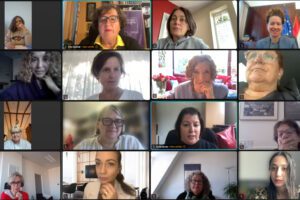This weekend, PES Women President Zita Gurmai and the PES Women team, together with PES President Stefan Löfven and many others, participated in the Korčula Summer School.
The event – which was first held on the Croatian island of Korčula thirty years ago – was organised by the Central & Eastern European Network for Gender Issues (CEE Network). A sister organisation of PES Women, the CEE Network promotes empowerment of women and gender equality objectives in mainstream strategies, policies and programs of centre-left, progressive and social-democratic political parties in Central and Eastern European transition countries.
For 2024, the Korčula Summer School gathered politicians and civil society actors to exchange on progress on gender equality and challenges that exist at the national level in southern Europe.
PES Women President Zita Gurmai said:
“I’m always so grateful to come here. For years now, we meet and take the temperature of the gender equality situation in Europe. This school has the huge added value of focusing on updates in Balkan countries, thanks to the presence of socialist politicians from these countries, which is crucial. The regularity of this event also enables us to effectively assess progress and what further steps are needed.”
President Gurmai also analysed the post-European elections period through the gender lens. She warned that the rise of the extreme right risked further backlashes against women’s rights across Europe and a reduction of women being appointed to EU institutions, further reducing already low representation. At the 2024 European elections, the percentage of women elected to the European Parliament fell for the first time in 45 years. At the same time, fewer women are expected to become European Commissioners in the next mandate.
Discussions also covered the burning issue of sexual harassment in the workplace, which predominantly affects women and occurs due to inadequate economic policies and labour rights concerning precarious work, especially in the film industry and media.



